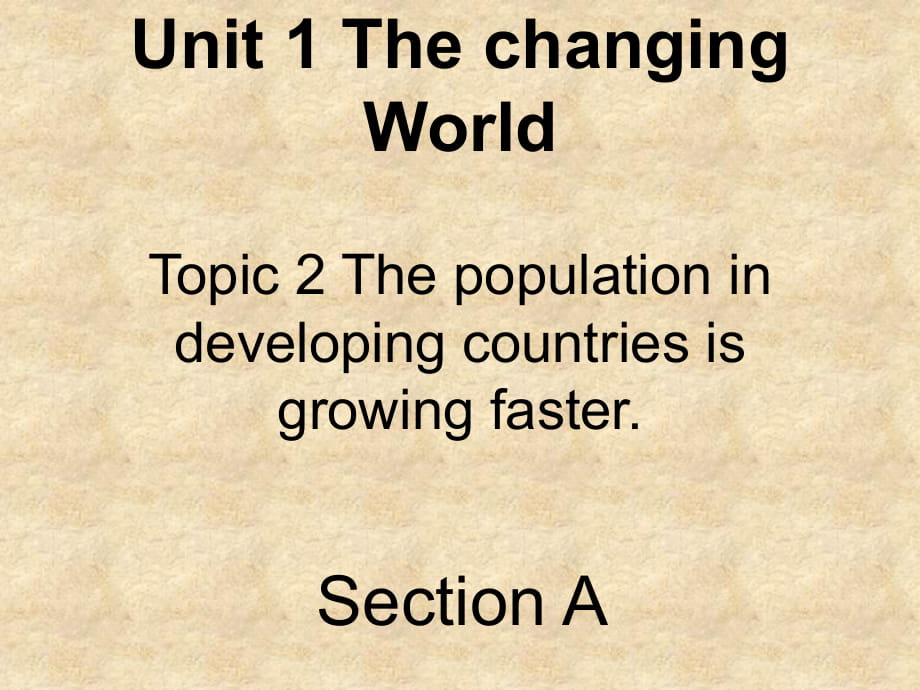《仁愛版九年級英語上冊 Unit 1 Topic 2 Section A 課件(共22張PPT)》由會員分享����,可在線閱讀����,更多相關(guān)《仁愛版九年級英語上冊 Unit 1 Topic 2 Section A 課件(共22張PPT)(22頁珍藏版)》請在裝配圖網(wǎng)上搜索����。
1、Unit 1 The changing World Topic 2 The population in developing countries is growing faster. Section A Have you ever been to Emei Mountain?I have already been there. I have just come back.No, I have never been there ./ No, I havent been there yet. Have Kitty and Cindy ever been to Huangguoshu Waterfa
2����、lls?Yes, they have already been there. They have just come back. Kitty and Cindy have already been to Huangguoshu Waterfalls. So+ 情態(tài)動詞/助動詞+主語表示:.也是。Echo has already been to Huangguoshu Waterfalls, too. Mr. Lian has never been to Huangguoshu Waterfalls . Neither + be/情態(tài)動詞/助動詞+主語表示:.也不����。Tracy has never
3、 been to Huangguoshu Waterfalls , either. Have you ever been to Liuzu Temple in Sihui?I have already been there, too.= So have I. Liang Jingci is new here. Jingci has never been to Liuzu Temple.So is Mr. Huang. = Mr. Huang is new here, too. Neither has Mr. Huang. = Mr. Huang has never been there, ei
4����、ther. I hated going there because it was very crowded.Kangkang hates going to a shopping center, too. why?I have already been to Changdachang Supermarket. 1b Listen to 1a and mark T (True) or F (False).1. Michael has just been to a shopping center. 2. Michael has never been there before.3. Michael h
5、ates to go to the place because he couldnt buy anything.4. Kangkang and Michael went back home together.5. Maria likes going there. ( )( ) ( ) ( ) ( ) 1c Read 1a and correct the five mistakes in the passage. Michael and Kangkang have just gone to a shopping center. They have never been there before,
6����、 but they dont want to go there some more because there were such many people that they couldnt find each other. Michael hasnt found Kangkang already. Maybe Kangkang has been home already. Both Michael and Maria hate going to a place like that. 1. been 2. _3. _4. _5. _ Correcting a passage is a good
7、 way to develop writing skills. any so yetgone 2 A. Look at the pictures and listen to the conversation. Then tick the places Steve has visited.shopping center cinema central park department store B. Listen again and fill in the blanks. Then practice the conversation with your partner.(Steve and H e
8����、len are talking on the phone.)Steve: I have just been living here for a few days. Could you tell me some interesting places around here?Helen: Have you _ been to the new shopping center?Steve: No. Ive _ been there before. But Ive _ been to a department store.Helen: Then you can go there to do some s
9����、hopping. By the way, have you _ been to the cinema nearby?Steve: Yes, Ive _ watched a movie there. It is wonderful.Helen: Have you been to the central park?Steve: No, I havent been there _.Helen: Then, you can have a walk there.Steve: Thank you.evernever justever yetalready Summary:現(xiàn)在完成時態(tài)中already, y
10����、et, just, never, ever用法區(qū)別 1����、already意思是“已經(jīng)”. 通常用于陳述句中(放在have和has的后面) 她已經(jīng)找到自行車了She has already found her bike. 2、yet用法 yet可用于否定句����,此時譯為“還”;(可放在句末)我還沒找到我的尺子����。 I havent found my ruler yet. 也可以用于疑問句,譯為“已經(jīng)”(放在have和has的后面也可放在句末) 你已經(jīng)找到尺子了嗎����? Have you found your ruler yet? 3����、just只用于陳述句意思是“剛才”(放在have和has的后面)我剛剛才收
11����、到了一封信����。 I have just received a letter. 4、never用于否定句譯為“從不”(放在have和has的后面)我從來沒有去過法國 Ive never been to France . 5����、ever用于疑問句譯為“曾經(jīng)”(放在have和has的后面) 你曾經(jīng)去過法國嗎? Have you ever been to France? SA重點短語和結(jié)構(gòu) get lost call sb. up hate doing sth./ hate to do sth like doing sth have a walk迷路給某人打電話討厭做某事愛好做某事散步 SA重點句1. 我
12����、剛打電話給你,但你不在����。 I have just called you, but you werent in.2. 我剛剛和康康去了一個購物中心。 I have just been to a shopping center with Kangkang.3. 我以前從來沒有去過那����。 Ive never been there before.4. 你找到他了嗎? Have you found him yet?5. 我也是����。 So do I.6. 我還沒有去過那兒����。 I havent been there yet.7. 我已經(jīng)在那看過一部電影了����。 Ive already watched a movie
13、 there. Choose the best answer.1. Have you returned the book _? Yes, Ive _ returned it. A. already, already B. yet, yet C. yet, just D. just, already 2. Jim, Maria _ just now, but you were not at home. A. called up you B. called you up C. calls up you D. calls you up3. I find it very important to le
14����、arn English well. _. A. So I am B. So do I C. So I do D. So am I4. China is _ that my mother likes it very much. A. such beautiful a country B. so a beautiful country C. such a country beautiful D. such a beautiful countryCBBD 1. Shes already been to Beijing. (改為一般疑問句) _ she _ to Beijing _?2. I have
15����、 seen the film. (改為否定句) I _ _ the film.3. Kate will read this book no more. (改為同義句) Kate _ read this book _ _.4. 孩子們在動物園里迷路了。 The children _ _ _ in the zoo.Has been yethavent seenwont any more lost their way Complete the following sentences. Homework2. Make five sentences , using ever, never, yet, a
16����、lready and just.1. Read 1a aloud.3. Preview Section B. 3 Read and understand the first sentence. Then complete the second one.1. I always lose my way in New York. I always _in New York.2. Yesterday Maria made a telephone call to Michael, but he wasnt at home. Yesterday Maria _ Michael _, but he wasn
17、t _.3. Mr. Brown is such a kind teacher that we all like him. This teacher is so _ that we all like him.4. I dont like to go to such a crowded place. I _ going to a crowded place _ this. get lostcalled upin kindhate like call _ _ watch _ _hate _ _ study _ _chat _ _ am/is _ _are _ _ find _ _go _ _ make _ _like _ _ have _ _called calledhated hatedchatted chatted were been went gone liked liked watched watchedstudied studiedwas been found foundd made had hade.g. jumpjumpedjumped
 仁愛版九年級英語上冊 Unit 1 Topic 2 Section A 課件(共22張PPT)
仁愛版九年級英語上冊 Unit 1 Topic 2 Section A 課件(共22張PPT)

